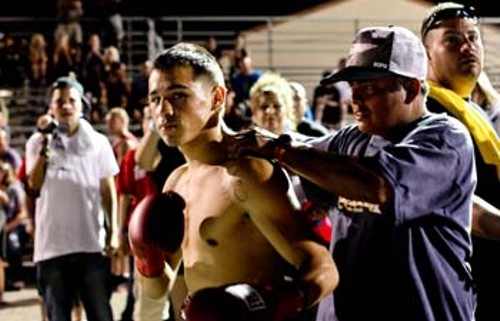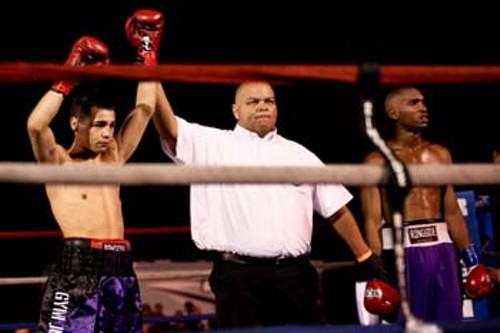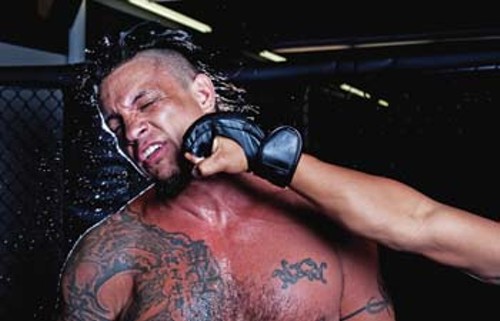When Jose Haro came out to the ring on a windswept Saturday night at the Utah State Fairgrounds, he was wearing a sombrero and poncho and waving two flags, one American, the other Mexican.
Proud to be a Mexican-American, he says, “I want to show that immigrants who come to this state are not all criminals. We do positive things.”
In Haro’s case, “positive things” was to rise to seventh in the ranks of national amateur welterweight boxers. He’s seen by many in the local fight scene as a gifted talent. “He’s a fabulous fighter,” says commissioner Rich Montanez. “We could even have a contender there.”
Pete Suarez Utah Athletic Commission Director Bill Colbert agrees. “A lot of people see Haro going someplace. They want to push him.”
But Haro faces an uphill struggle. While the Utah boxing scene has long been plagued with turf-centric, provincial squabbles, Haro’s fight career since turning professional demonstrates the range of obstacles a pro boxer faces in Utah, a state once renowned for world-class boxers. Just finding an audience is hard enough. The only way boxing promoter Eddie “Flash” Newman can put on boxing bouts is if he supplements his card with MMA fights.
“Boxing has always had an element of colorful people,” says former commission chair Larry Fulmer, whose uncle Gene Fulmer won the world middleweight boxing title in 1975. “That’s why I stay involved. There are many you’d not turn your back on, but others you’d trust with your life.” One of Utah’s brightest boxing lights, Haro’s slim, boyish charms oddly suggest him as also one of its most vulnerable, down to the braces he wore at his most recent bouts. “Boxing in the pros is a dirty sport,” he says. “It’s all about politics.”
Haro’s boxing career began at age 12, when he was caught shoplifting at a grocery store. “We were never as wealthy as other people,” he says. His father started training him in boxing as a way of keeping him out of trouble. “I want you guys to promise me you’ll finish school and go to college,” Haro’s father said to Jose and his brother.
“In my family, we like winners,” Haro says. “When you do something, you do it all the way.”
Initially, Haro’s father trained them at Leo Montoya’s Guadalupe club. “He trained me to be aggressive, to hit and move, to constantly be on that guy’s face.” His father took Jose to fight on the west coast, giving him opportunities that few other Utah amateur boxers had. By the time his father stopped training him because he had joined a Mexican band to play in clubs and bars, Jose had 21 wins and no losses as an amateur.
Amateur boxers in Utah have a rudimentary skill, Jose Haro says, little more than a “one-two combination” of, say, a right-hand and a jab. When Utah fighters get in the ring, “they often lose right off the bat. We have that reputation of getting stopped.” Thanks to his out-of-state experience fighting higher-quality opponents, Haro was a formidable foe in the national amateur ranks.
“When I fight, I fight for my state,” he says. “I let them know we have talent, to give us a chance.”
When Haro was 18, Rick Montoya agreed to coach him. While Haro is critical of Montoya’s coaching, he nevertheless rose through the national amateur ranks. Montoya is an oddly nomadic figure who takes his group of young, amateur fighters periodically from one gym to another. President of Utah’s Amateur Boxing Association, Montoya recently survived an attempt to oust him from that role by several unhappy board members.
When, Haro says, he not once but twice he made it to the third round of a national tournament only to lose on a split decision, he decided to strike out on his own and started training at Eddie “Flash” Newman’s gym in Holladay. “If it wasn’t for Eddie, I don’t know where I’d be,” he says.
Newman’s occasional mixed fight cards provide Haro with the prospect of fights, although the promoter is not Haro’s manager—the young fighter managing himself.
The professional debut Newman arranged for Haro raised many eyebrows in the Utah fight scene. That was because Haro’s opponent was Augustin Espinoza [see "Battling Brothers"], a mixed martial arts fighter with no boxing experience. Haro knocked out Espinoza after 27 seconds with a straight right to the belly at the Marriott Hotel in August 2010.
That victory came the same night PSUAC director Bill Colbert canceled a mixed martial arts fight on Mike Stidham’s fight card because he saw it as a mismatch. Stidham, and others in Utah’s local fight scene, argue the Haro-Espinoza match was an example of a mismatch of one of America’s leading amateur boxing talents against someone with no boxing experience.
In December 2010, Haro suffered a devastating blow. Eighteen years before, his father had agreed in court to voluntarily return to Mexico, since he was undocumented. His father, however, had not followed through, and when he was pulled over by the police before Christmas, the 52-year-old Mexican national was arrested and deported. Haro’s mother and siblings moved to Mexico to be with him.
A week after his father’s deportation, Haro knocked out Martin Chaparro— arguably not a great challenge either, since the one pro-fight Chaparro had had, he’d lost.
In March, Newman rematched Haro with Espinoza. Colbert says he probably shouldn’t have sanctioned the second bout. Newman’s critics saw the rematch as further evidence that the promoter was “stuffing” Haro’s card with walkovers.
In boxing, Newman and Haro acknowledge, “you are nothing if you don’t have a record,” Haro says. Newman says those who argue he is giving Haro lame ducks to fight “are full of shit.”
But Espinoza had the last laugh. An overly confident Haro came out expecting to deal with Espinoza quickly, but his opponent had other plans. “He came out fighting,” Haro says. “I wasn’t expecting that.”
Espinoza had a point to make. He knew he could finish a round with Haro. “I fought the first round with my whole heart, I opened his lip, I messed his eye.” Haro disputes Espinoza hurt him. Newman, however, praises Espinoza. “Espinoza rang Jose’s bell,” he says. “He hit him, cut him with a great shot.”
A month later, Haro fought four grueling rounds against Adarryl Johnson in Ogden before the judges gave him the fight as unanimous decision. By comparison, the Utah State Fairgrounds fight against David Warren Huffman was anticlimactic. Huffman started fast, but before the end of the first round, Haro caught him with a left hook to one side, a right hook to the other. Huffman hit the canvas, grimacing in pain.
Rep. Greg Hughes, R-Draper, was ringside with Willy Walton, a boxer he managed until recently. Hughes enthused after the bout over Haro’s improved speed and the precision of his knock out. “I love K.O.s to the body,” he says, admiring the way Haro “crushed” his blows to Huffman’s sides, resulting in his Huffman “losing his will” to carry on.
But Hughes, more than most, knows how dark the boxing world can get. When he managed Walton, his fighter flew down for a Las Vegas fight. Hughes received a call saying Walton was medically unfit to fight because a CAT scan had revealed he had spots on his brain. Hughes was horrified. But when he arrived in Las Vegas, he saw that Walton’s opponent was 15 pounds over the contractual weight for the bout. If the bout had taken place, Walton would automatically have been awarded the win.
Hughes had the promoter send him Walton’s CAT scan. There was nothing wrong with the fighter’s brain. “We got scammed, absolutely gamed,” Hughes says. The promoter robbed Walton of a great opportunity. “This is the boxing climate and it’s too much for me,” Hughes concludes.
Despite so much behind-the-scenes chicanery, Hughes says boxing is still the best way to save at-risk youth, something that Haro attests to. What Haro loves most about boxing is “that it is a one-man sport. When you win a fight, that’s all you, your skills, your heart.” But he wants to hang up his gloves by the time he is 29 or 30. Not only does he want to be a police officer, but he also wants to avoid being like some of the boxers he knows who slur their words. “I want to remember my family and friends,” he says.
Colbert hopes Haro will face stronger fighters in the future. “He’s a very talented young man. He needs to get someone to manage him.” Several gym owners and trainers say they want to manage Haro, but for now his eye seems to be on beefing up his record with wins—with Newman’s help.
Larry Fulmer argues that Haro’s biggest challenge is getting fights out of the state. “If Jose is going to go anywhere very far, he needs contacts outside of Utah, where professional boxing is still a big-money sport.”
Haro believes the money will eventually come. “I just wish I could bring my dad back,” he says with a shy smile.
More by Stephen Dark
-
Call it a Comeback
Long mired in economic depression, Midvale’s Main Street dusts off its small-town charm.
- Sep 20, 2017
-
Love Letters
Correspondence between a young woman at the Topaz internment camp and her beloved sheds light on Trump's America.
- Sep 6, 2017
-
Triggered
Veterans Affairs exists to help vets. So why did the Salt Lake VA appoint an anti-veteran chief?
- Aug 30, 2017
- More »
Latest in Cover Story
Readers also liked…
-
Forget the family pedigree—Robert F. Kennedy Jr should not be the next president of the United States
Trojan Horse
- Jun 21, 2023
-
Women decry harassment and toxic culture at St. George auto dealership
Men at Work
- Oct 11, 2023







